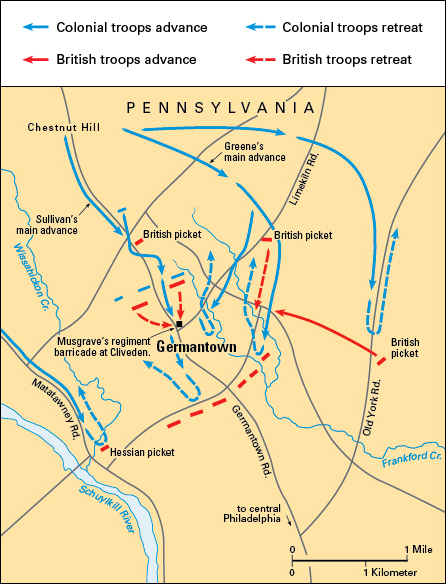Germantown, Battle of, was an important British victory during the American Revolution (1775-1783). It took place on Oct. 4, 1777, at Germantown, Pennsylvania , northwest of central Philadelphia . American General George Washington led a patriot attack against the British, but a heavy fog led to confusion among the attackers. A British counterattack, led by General Sir William Howe , forced the Americans to retreat.
Background.
On Sept. 11, 1777, General Howe’s British force defeated patriot troops under General Washington at Brandywine Creek in southeastern Pennsylvania. The Americans endured further losses on the night of September 20-21 at Paoli, Pennsylvania. There, British Major General Charles Grey directed a successful nighttime bayonet attack against a patriot force led by Brigadier General Anthony Wayne . The victories by Howe and Grey allowed the British to occupy Philadelphia on September 26. Philadelphia was at that time the American capital.
Reinforcements from the Continental Army and state militias (forces composed of short-term citizen soldiers) joined Washington’s force after the loss at Brandywine. By October, his army included about 8,000 Continentals and 3,000 militiamen from Maryland, New Jersey, and Pennsylvania. Though the British had captured Philadelphia, Washington was encouraged by patriot successes at Saratoga , New York.
Germantown.
Washington’s army set up camp about 15 miles (24 kilometers) to the west of Philadelphia. His chief senior commanders included generals Wayne, Nathanael Greene , Henry Knox , and John Sullivan. The force also included future president James Monroe , then a young lieutenant. Washington learned that Howe had divided his British army to defend Philadelphia.

On October 3, Washington set out toward a force of 9,000 British troops camped at Germantown. Around 2 a.m. on October 4, the Americans stopped about 2 miles (3.2 kilometers) west of the British pickets (guard stations).
At about 5 a.m., American forces, arranged in four columns, began converging on Germantown. General Sullivan led Continental troops, including Wayne’s division, down Germantown Road toward the center of town. Continentals under General Greene, to the east of Sullivan, marched down Limekiln Road. Militia companies advanced down the Old York and Matatawney roads at opposite ends of the town.
At about 5:30 a.m., Sullivan’s column surprised Howe’s outposts (sentries), forcing them to retreat. British Lieutenant Colonel Thomas Musgrave and 200 men from his 40th Regiment of Foot barricaded themselves inside Cliveden, a large stone mansion overlooking the Germantown Road. Musgrave’s men held this stronghold throughout the remainder of the fight, delaying Sullivan’s advance and giving the rest of Howe’s troops time to fall into battle formation.
General Greene began his attack nearly an hour late, but he still managed to capture part of the British camp. A dense fog hung low over the battlefield.
The Americans’ attack had started well, but low visibility soon led to confusion. Patriot troops accidentally fired on one another, inflicting damage and causing critical delays. In addition, the militias on the ends of the battlefield failed to advance far enough to significantly engage their British opponents. A timely counterattack by Howe stopped Sullivan’s advance. British reinforcements, arriving from Philadelphia, helped to recapture the camp. Washington tried to regroup his forces but managed only to arrange an orderly retreat.
Aftermath.
During the course of five hours of fighting, the Americans suffered about 150 killed and 500 wounded. About 400 Americans were captured. About 70 British troops were killed, and 450 were wounded.
After the defeat at Germantown, Washington withdrew his men to their winter quarters at Valley Forge , Pennsylvania. On October 17, Americans under Major General Horatio Gates forced the surrender of a large British army at Saratoga. That victory, along with Washington’s ability to surprise the British at Germantown, encouraged France to enter the war as an ally of the United States. France provided key assistance that helped the Americans win the war.
Germantown, which had been founded by Quakers in 1683, became part of Philadelphia in 1854.
